Clash of Titans
Games featuring a future Hall of Fame coach on each sideline.
November 3, 1962: Ole Miss @ LSU
Johnny Vaught vs Charlie McClendon
On September 29, 1962, #7 Ole Miss defeated Kentucky 14-0 at Veterans Memorial Stadium in Jackson MS to run their record to 2-0. Coach Johnny Vaught allowed his players to return to the campus in Oxford on their own.
As they arrive on campus Sunday night, players notice that Federal marshals have surrounded the Lyceum Building. "What are they doing here?" the players wonder.
Hundreds of students fill the grass circle in front of the marshals. It feels almost like a pep rally. Coeds ride on the back of convertibles on the street in front of the building with Rebel flags flying from the cars.
A chant breaks out: "Two, four, six, eight ... hell no, we won't integrate." And, "Two, one, four, three, we hate Kennedy!"
The reference is to President John F. Kennedy who is charged with enforcing a U.S. Supreme Court court order commanding the all-White university to admit an African-American applicant, James Meredith.
Multiple attempts by Meredith, accompanied by federal officials, to enroll were physically blocked. Hoping to avoid violence and ensure Meredith's enrollment, Kennedy and his brother, Attorney General Robert Kennedy, had a series of unproductive telephone conversations with Mississippi Governor Ross Barnett.
Finally, Meredith and 24 U.S. marshals arrive on campus Sunday afternoon to insure his enrollment the next day. He is first taken to Baxter Hall, the dormitory where he will board. Meanwhile, 583 other federal law enforcement officers arrive on campus.
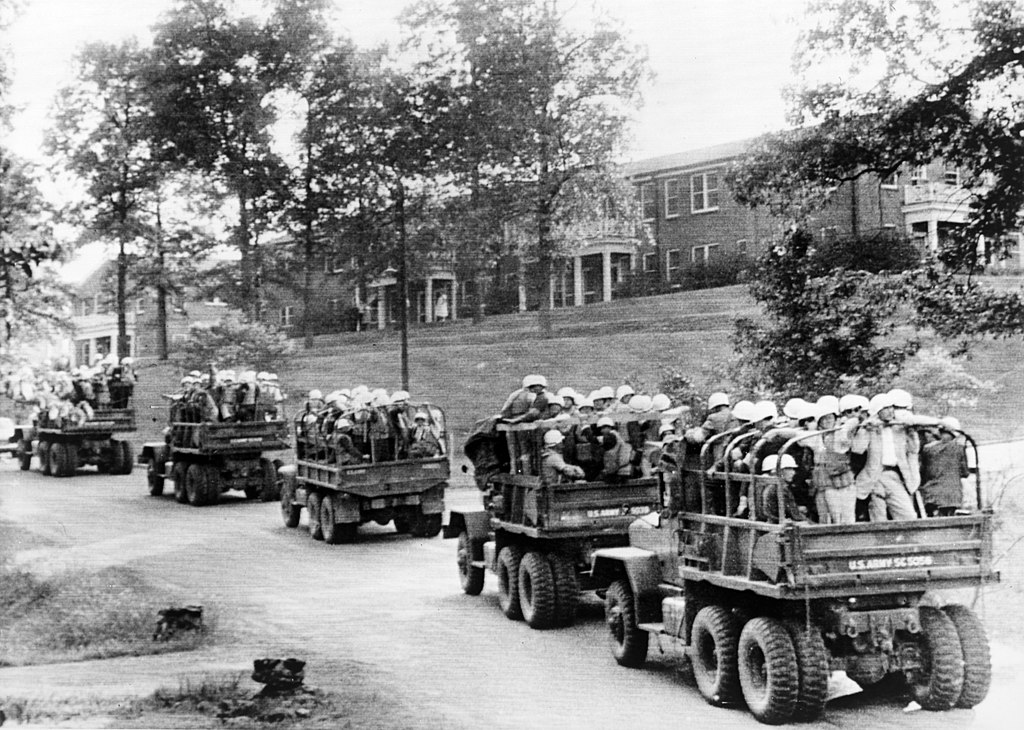
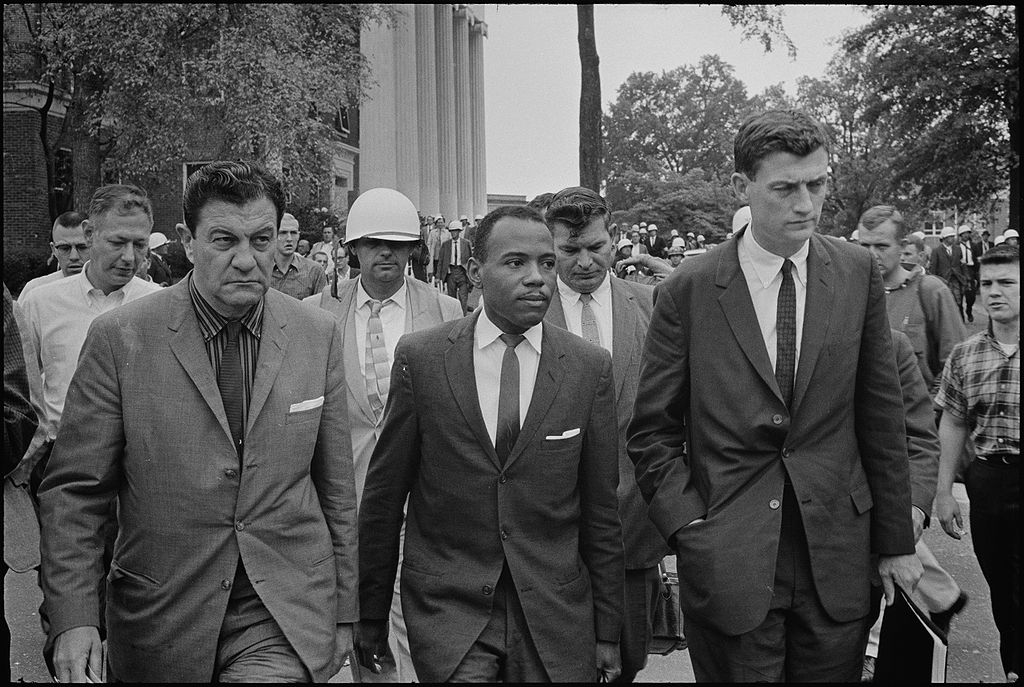
L: U.S. marshals arrive on Ole Miss campus; R: Marshals escort James Meredith to class.
Coach Vaught goes to Miller Hall where his football players lived. He tells them to stay inside with the doors locked so no one could come in.
After swelling to 2,500 protestors, the mob becomes increasingly violent as they surround the marshals and other federal officers who are encircling the Lyceum. As the president speaks to the nation on television from the Oval Office, he is unaware that a riot has broken out at Ole Miss.
Rioters fire at the Feds, throw Molotov cocktails, acid bottles, lead pipes, and bricks. They even commandeer a fire engine in an attempt to run over the marshals. Several reporters covering the situation are wounded by gunfire. The marshals resort to tear gas to disperse the crowd with limited success.
Around 10 PM, Kennedy orders the U.S. Army and 67 National Guardsmen to suppress the riot. Arriving at 2 AM, they manage to keep the mob from invading the Lyceum and killing Meredith. Eventually, 30,000 federal troops occupy the campus. Amazingly, only two people are killed, both journalists.
Amid the carnage, Vaught gathers his players in the team dormitory and tells them, "We have to band together. We have a purpose. We must keep our poise."
Finally, the 101st and 82nd Airborne arrive from Memphis and drive the rioters off the campus.
When the dust clears, the tally shows 160 wounded, 28 of them by gunfire.
The next day, Meredith enrolls and attends his first class with marshalls protecting him 24 hours a day. However, the white students avoid any association with him.
Some politicians demand a total shutdown of the school, and straw polls show half of Mississipians agree. But shutting down Ole Miss means no more football. So Robert Kennedy calls Coach Vaught and asks him to "do what you can to keep the situation calm."
The Ole Miss-Houston game scheduled for Oxford the next Saturday is moved to Jackson(after talk of canceling it or playing it in Houston. Despite the disruption of their normal game week preparation, the Rebels romp 40-7.
An Associated Press reporter writes a story of the game underneath this headline: "CHEERING FOOTBALL CROWD PUSHES RACIAL STRIFE ASIDE." The first sentence of his story is this: "College football temporarily dulled the anguish of racial strife in Mississippi Saturday."
The Rebels shutout their next two foes, Tulane 21-0 and Vanderbilt 35-0.
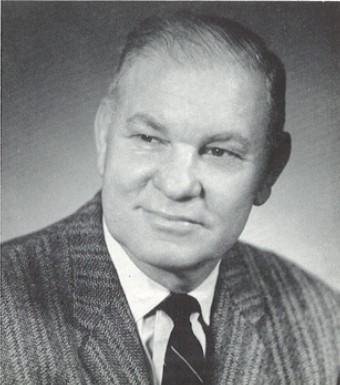
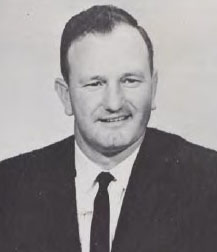
L: Johnny Vaught, University of Mississippi Ole Miss Yearbook - Class of 1963
R: Charles McClendon, Louisiana State University Gumbo Yearbook - Class of 1963
That clears the decks for the annual meeting with LSU. The Saturday night game in Baton Rouge matches the #4 Tigers with the #6 Rebels, who have dropped several notches in the polls because of "weak opposition."
LSU ruined perfect seasons for the Rebels in 1958, '59, and '60. Over the last four years, the Rebs have lost only one regular season game to a team other than the Bayou Bengals. Ole Miss brings a perfect record to the LSU game for the fifth straight year.
The Tigers have a new coach after Paul Dietzel left for West Point. His successor is his defensive assistant, Charlie McClendon. His first team is 5-0-1 as they prepare for Ole Miss and its vaunted Winged T offense with a wingback in motion. The winning team will have its choice of New Year's Day bowl games. LSU is favored by three points.
Vaught locks down practices and installs some secret plays. A pep rally is held Thursday night with soldiers standing watch. When it ends, 200 students sprint past Baxter Hall, where the troops protecting Meredith come to attention, and on to Miller Hall, where they cheer the team for a half hour.
Friday morning, an airplane, "allegedly from Louisiana but rumored in some circles to belong to ardent Rebel supporters attempting to build a bigger fire under Ole Miss," drops thousands of leaflets on the Oxford campus. "Go To Hell, Ole Miss!" "We'll Crush You!" "You Pansies!" and so on. Lastly, "Come On Rebels, We're waiting for you! We'll grind you into the dirt."
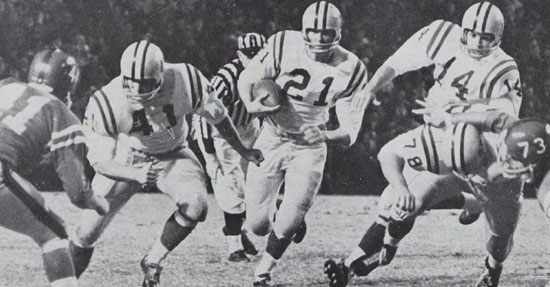
Jerry Stovall (21) takes handoff from Jimmy Field (14) as Steve Ward (41) and Fred Miller (78) block. (Louisiana State University Gumbo Yearbook Class of 1963)
Rebels Start Sluggishly
A stiff 15mph wind blows across the field off the river.
After stopping the Rebels on their opening possession, the Tigers drove from their own 43 to the six. The big plays were QB Jimmy Field's 25y third-and-10 pass to E Jack Gates to the Rebel 32. Then HB Jerry Stovall skirted right end for 21 and another first down at the 12. But the next three plays gained only 6y. So Lynn Amedee tried a field goal from the 12 that went awry.
Facing the Chinese Bandits, LSU's defensive specialists, the Rebels moved from their 20 into Tiger territory. The key play was a 33y pass from senior QB Glynn Griffing to Chuck Morris. But the visitors could go no further.
Late in the period, LSU got a chance when Stovall, one of the finest defensive backs in the nation, intercepted a Griffing pass at the LSU 38 and returned it 6y. But a holding penalty squelched the Bengals' possession.
Tigers Strike First
LSU finally scored late in the second quarter after another pick, this one by LB Ruffin Rodrigue at the Rebel 29. LSU's "Go Team," the offensive specialists in that era of limited substitution, scored in eight plays. The key play was QB Amedee's pass to HB Ray Wilkins at the three. Stovall returned to the field and slanted off right tackle into the end zone. Amedee kicked the PAT. LSU 7 Ole Miss 0 with just 2:27 left in the half.
Ole Miss Finally Scores
The Rebel offense finally came alive and drove 71y to pay dirt, chiefly on passes. Dave Jennings returned the kickoff 30y to the 39. QB Jim Weatherly's 7y toss to Allen Brown started the drive. An offside penalty on the Tigers kept the drive moving into LSU territory. One of the big gainers was one of the trick plays the Rebs had practiced all week. Griffing fumbled the snap on the extra point try, and LSU went to the locker room ahead 7-6.
After halftime, the Rebels took the lead for good on their opening possession. With excellent field position at their 45, they stayed mostly on the ground, but a key play was one of the new ones Vaught installed during the week. From the LSU 21, HB Chuck Morris took a pitch to the right, faking a run, only to pull up short and toss the ball to WB Louis Guy for an 18y gain. It was the first completion of a halfback pass by the Rebels in four years. Two plays later from the two, Griffing rolled out and threw to Guy for the touchdown. The Bengals had practiced that play all week and tried it themselves later in the game only to have Stovall tossed for a big loss. The Rebels went for two, but Griffing was hauled down short of the goal. Ole Miss 12 LSU 7
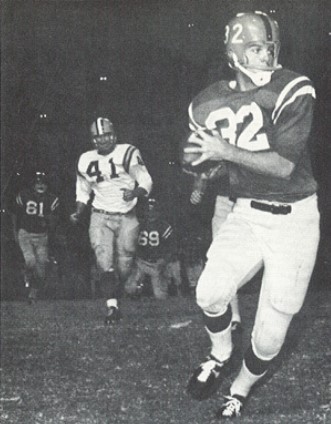
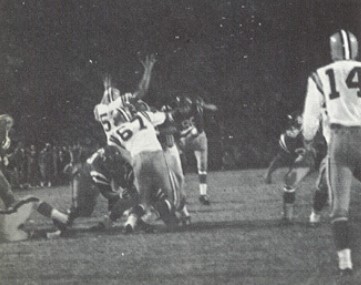
L: Louis Guy catches a halfback pass from Chuck Morris.
R: Wes Sullivan kicks clinching field goal.
(University of Mississippi Ole Miss Yearbook - Class of 1963)
Rebels Add Field Goal
The pattern continued – Ole Miss stifling LSU's offense and the Tigers fending off the Rebels' thrusts into their territory.
Early in the fourth quarter, the Rebels drove to the eight with Griffing's passes gaining most of the yardage. But they had to settle for Louie Sullivan's 25y field goal to make the final score Ole Miss 15, LSU 7.
Ole Miss's domination was evident in the statistics. They outgained LSU 393-107, almost 4-to-1.
As time ran out, the Ole Miss players ran off the field yelling, "We're No. 1!" The locker room was a madhouse. Vaught stood calmly amid the chaos. He couldn't wait for the new rankings to come out. Asked by a reporter if he had any doubt that his team will be at the top of the polls, Johnny replied, "None at all."
The Rebels jumped two spots to fourth, but undefeated Alabama and USC were still ahead of them. Both would have to lose for Ole Miss to have a shot at the national championship. Alabama did, but USC did not.
The Rebels finished the season undefeated but rose no higher than #3 in the final rankings behind USC and Wisconsin.
Coach Vaught wrote this in his autobiography about the 1962 season: "College football makes a significant contribution to our American way of life, something it has been doing since 1869 ... I saw its value in 1962 as few coaches have. That year, Ole Miss football had its finest hour and made discipline and honor a landmark in days of agony and violence."
Vaught added: "I am convinced that successful football kept Ole Miss from closing its doors that year."
References
Outside the Lines: Ghosts of Mississippi, Wright Thompson, espn.com
Rebel Coach: My Football Family, John Vaught (1971)
Outside the Lines: Ghosts of Mississippi, Wright Thompson, espn.com
Rebel Coach: My Football Family, John Vaught (1971)